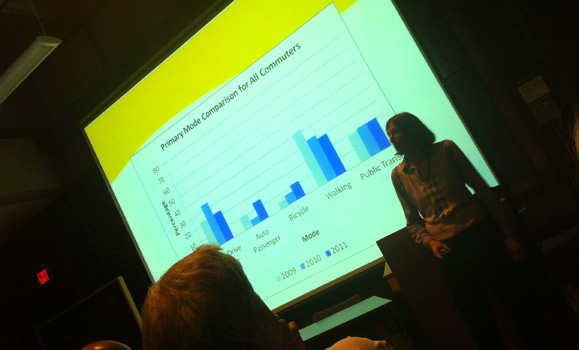On Wednesday afternoon, the Dal community got a first glimpse of planned changes to transportation and parking this fall.
Two of the more prominent items included a new online system for purchasing and renewing parking passes, and confirmation that there would not be a cap on general parking permits this fall.
The town hall session at the Killam Library, the first of four that will take place over the coming weeks, was attended by more than 50 people, and outlined initiatives that the Transportation and Security Committee is proposing for this September. The committee, with representatives from across the university, reviews matters relating to security and transportation demand management (TDM).

The presentation began with an overview of TDM planning at the university, as well as the latest results from Dalhousie’s commuter survey. (Last year, for example, more than 60 per cent of the Dal community walked, took public transit, or biked as their primary mode of getting to campus; almost a quarter drive alone.) It ended with a Q&A allowing audience members to share their ideas or concerns with the panel, which will be brought back to the committee for consideration.
New initiatives for 2012-13
After introductions from Ken Burt, vice-president finance and administration, and Ray Ilson, chair of the Transportation and Security Committee, Rochelle Owen, director of sustainability, offered details on some of the broader transportation initiatives her office is leading:
- A pilot employee bus pass program, targeted for launch in January 2013, with 600 full-year passes available for employees at a 25 per cent discount compared to the normal purchase price. Dal will be the first employer in HRM to have the service.
- Support for cyclists, including a new institutional cycling plan with Capital Health, SMU and the IWK Health Centre and increases in the number of bike racks to 750 across Dal’s three current campuses.
- Relaunching Dal’s ride-share program for car- and van-pooling, offering a guaranteed reserved spot for full-time students or employees who share a ride between two or more persons (provided they do not live at the same address) at least four days a week.
- Continuing to research the feasibility of a park-and-ride shuttle program.
Next, Mike Burns, director of security, outlined several new efforts aimed at improving the parking experience this fall. The largest of these will be moving the permit purchasing and renewal system online so that employees and students won’t have to drop into Dal Security and wait in line to get their pass.
Other items shared included:
- There will be no cap on general parking permits this September; everyone will have the opportunity to purchase one if they so wish.
- To better support those who only need to park on campus occasionally, or for short periods, Dal is planning to add pay-and-display parking. The current plan is for the Hancock lot (corner of Coburg/Oxford) to have a pass machine installed at some point in the next year, allowing travellers to buy an hourly or day pass for space in the lot. (It will also remain open to all general parking permit holders.)
- Dalhousie will start managing its own ticketing system on campus property, as opposed to handing out HRM tickets. This will allow proceeds to be re-invested in transportation-related initiatives on campus.
- Rather than having cars towed when they‚Äôve accumulated more than three parking tickets, Dal Security will now use an immobilizing ‚Äúb¥«¥«≥Ÿ‚Äù on infracting vehicles. To have the boot removed, drivers will only have to pay a $75 removal fee to Dal Security, rather than the $115-$140 (plus tax) it can cost to pick up a vehicle from the towing depot.
In the discussion that followed, there were a number of attendees who raised concerns about the availability of general parking ‚Äì specifically, whether the pay-and-display parking or the paving presently ongoing near the LSC would limit the number of available spaces. Mike Burns explained that the paving near the LSC will actually increase spaces, and that pay-and-display parking in the Hancock lot can only be purchased if space is available; general passes can still be used throughout the lot. There were also questions clarifying the details of the ticketing and ‚Äúb¥«¥«≥Ÿ‚Äù systems.
Working with Dal's parking capacity
One prominent subject that came up was the Dunn lot, which last year was converted into a reserved parking lot. Mr. Burns explained that there remains a wait list for the lot, which the university continues to work through as space becomes available; there will not be a redraw or reassigning of spaces. (He added that those who wish to know where they are on the list can contact the Security office.)
In response to questions about perceived underuse of the lot, Mr. Burns said the university is presently overselling it by about 10 per cent and continues to evaluate its use to improve efficiency while still ensuring parking for those with a Dunn pass.
Ken Burt added that one discussion that he hopes to bring forward with the Transportation and Security Committee in the near future is about access to parking on campus. He says he’s concerned that occasional or sporadic drivers may be taking up reserved or general space best used by other members of the Dal community.
“Who’s entitled to park on campus?” he asked, rhetorically, acknowledging that it’s not the simplest question. “But it’s an important one to consider as we think about using our limited space more effectively.”
Parking town halls
Interested in learning more about parking and transportation on campus, including pending changes this fall? There are three more discussions scheduled:
- Friday, July 27th – Carleton Campus
, Tupper Theatre B, 
11 am – 12 noon

- Tuesday, July 31st – online, 
11 am – 12 noon (the site will be open to participants at 10 am)

- Wednesday, August 1st – Sexton Campus, 
D Building, Room 416, 
12 noon – 1 pm

